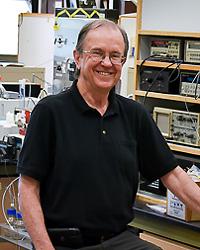Peter Tremaine

Find Related People by Keyword
UNENE Research Chair (2021-2026); NSERC Industrial Research Chair (2016-2021)
In 2016, Prof. Peter Tremaine was named the NSERC/UNENE (University Network of Excellence in Nuclear Engineering) Senior Industrial Research Chair in High-Temperature Aqueous Chemistry. Industrial Research Chair Grants are awarded to researchers considered international leaders and exceptional among their peers. The chair is worth nearly $2.5 million over five years, with $930,000 coming from NSERC and more than $1 million from industry.
Capabilities
Quantitative measurement of thermochemical, transport and spectroscopic properties of aqueous solutes in high- temperature aqueous solutions using multiple techniques: calorimetry, densimetry, conductivity, solubility, UV-visible spectroscopy and Raman spectroscopy. Speciation, equilibrium constants, phase behaviour, and excess and apparent molar heat capacities and volumes of electrolytes at temperatures up to and above the critical point of water at 373 oC and 22 MPa. Chemical equilibrium modelling and database development for nuclear and thermal power applications.
Education and Employment Background
Dr. Peter Tremaine received his PhD from the University of Alberta in 1974. He went on to work as a Professor at Memorial University Newfoundland (1990-1996) where he was Head of Chemistry. Tremaine was Manager of the AOSTRA In Situ Oil Sands Research Program, at the Alberta Research Council between 1986 and 1990 and Research Officer Atomic Energy of Canada Ltd. between 1975 and 1980. He joined the University of Guelph’s Department of Chemistry in 2001. Tremaine served as the dean of the College of Engineering and Physical Sciences from 2001 to 2006. He is currently a full professor and holds an NSERC Senior Industrial Research Chair in High-Temperature Aqueous Chemistry.
Research Themes
Tremaine’s research is focused on hydrothermal chemistry. He aims to understand the behaviour of aqueous systems at the extremes of temperature and pressure and apply his results to issues related to the steam-generating and heat transport systems in nuclear and thermal electrical power stations, geothermal ore bodies, carbon capture/sequestration, and deep-ocean hydrothermal vents. His work has had an impact on underlying science; thermal and nuclear power generation; heavy oil recovery; geochemistry and materials science. Tremaine’s research focuses on the following major themes:
- Physical chemistry of ions and organic solutes in very high temperature water. Weak acids and bases, and their salts, are useful solutes for probing high temperature solvation phenomena because they provide a direct means of examining the relative effects of ionic, and uncharged functional groups.
- CANDU nuclear reactor chemistry. This laboratory research partners with the University Network of Excellence in Nuclear Engineering (UNENE), the CANDU Owners Group (COG), and The Nuclear Waste Management Organization (NWMO) and the Electric Power Research Institute (EPRI). UNENE and COG are Canadian non-profit organizations that generate electricity through nuclear technology, and NWMO is responsible for the geological storage of Canadian nuclear spent fuel. EPRI is an internationally funded non-profit that carries out research on electric power generation. The research carried out through the UNENE Research Chair contributes to the development of chemistry control strategies, the high temperature water heat transport circuits, and to modelling radionuclide transport in geological spent fuel repositories.
- Generation IV and SMR Nuclear Reactor Chemistry. This fundamental research supports Canada’s emerging research program for the Generation IV supercritical water reactor, small modular reactors (SMRs) and hydrogen co-generation technologies. Tremaine and his research team are working to determine ionization constants and ion association constants up to and above the critical point of water.
- Carbon Capture and Sequestration by Novel Phase-separating Solvents. The chemical absorption of carbon dioxide (CO2) in mixed solvents is a promising technology for carbon dioxide capture from post-combustion industrial effluents to reduce global warming. Collaborative research with a Canadian company and the Université Blaise Pascal measured thermochemical data and elucidated structure-property relationships needed to design suitable de-mixing amines for CO2 absorption.
- Origins of Life. The behaviour of amino acids under hydrothermal conditions is of interest to physical chemists seeking models to examine the hydration of zwitterions in high temperature water, and to geochemists investigating possible mechanisms for the origins of life in deep ocean hydrothermal vents.
Courses
- CHEM 2820 - Physical Chemistry: Chemical Thermodynamics and Kinetics
- CHEM 7500 - Physical Chemistry: Aqueous Solutions and Interfaces
Highlights
- NSERC / UNENE Senior Industrial Research Chair in High-Temperature Aqueous Chemistry
- Fellow of the Chemical Institute of Canada (FCIC)
- Hugh M. Huffman Memorial Award, North American Calorimetry Conference, 2014
- Honorary Fellow, International Assoc. Properties of Water and Steam (IAPWS)
- Editorial board of the Journal of Solution Chemistry, 2012-present
- International Water Conference Paul Cohen Award, 1996
- President of the International Association for the Properties of Water and Steam 1999-2001
- Scientific Advisory Panel to the Board of Directors, Atomic Energy of Canada Ltd., 2007 to 2011
Media Coverage
Clean energy
Nuclear water chemistry
- Guelph Today: Understanding nuclear water chemistry
- Guelph Mercury Tribune: U of G prof’s research is extending the life of nuclear reactors
Honors and funding
- Guelph Today: Research excellence spans the breadth of Guelph’s campus (8 photos)
- U of G: Ontario Government Invests in U of G Research
- U of G: Prof Receives NSERC Industrial Research Chair to Advance Nuclear Reactor Research
Industry partnerships:
Current partners are the University Network of Excellence in Nuclear Engineering (UNENE), the CANDU Owners Group (COG), and The Nuclear Waste Management Organization (NWMO) and the Electric Power Research Institute.